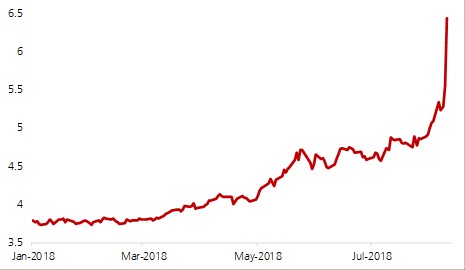Crisis-hit Turkey’s woes continued to worsen today, raising worries about exposures of other emerging market countries to a rising dollar exchange rate and escalating trade protectionism. Equity markets fell.
The lira, which crashed last week amid a deterioration of Turkey’s relations with the US and worries about dollar-denominated debt exposure, remained under pressure when markets re-opened after the weekend.
Fears are growing that Turkey, an emerging market economy that had been seen as a success story after an International Monetary Fund bailout a decade and a half ago, is once again in trouble, and now led by a populist with a strong authoritarian streak, Recep Tayyip Erdogan. The country is at loggerheads with the US administration of President Donald Trump, initially prompted by US anger of the detention by Turkey of an American pastor. Trump subsequently announced a doubling of steel and aluminium tariffs – hitting Turkey, for whom these are important export earners. Erdogan, in speeches and in print, has shown no sign of backing down. With a significant amount of its international debt in dollars, this means that a rising dollar exchange rate, fuelled to some degree by a strong US economy and expectations of higher Federal Reserve rates, is pressurizing Turkey.
The euro-lira rate, which on Aug 13, 2017 showed that the euro fetched TRY4.058, now buys TRY7.831, with the lira plunging over 20 per cent in less than a fortnight. The dollar-lira rate has edged over TRY7.0 and then retraced slightly, having been TRY3.53 12 months’ ago.

Source: DBS, Bloomberg
The S&P 500 Index of US stocks ended last week down 0.7 per cent on Friday; today, European bourses fell from the open; Chinese and most other Asian indexes fell from the open. The MSCI Emerging Markets Index is down about 8.3 per cent from the start of 2018.
“Geopolitical dramas have captured the markets’ imagination, yet historically when the Federal Reserve raises interest rates in order to pul lback inflation, emerging markets crash,” Peter Rosenstreich, head of market strategy for Swissquote, said in a note.
The lira crisis, by a coincidence, marked roughly the exact 20th anniversary of the Russian debt default , an event that also coincided with the Federal Reserve-led rescue of the hedge fund Long Term Capital Management.
“A signature of crisis is rumour, and they are swirling of global banks cutting credit to Turkish banks. TRY bulls were hoping for a hammer in the form of higher interest rates from policy makers, but instead got an inadequate response,” Rosenstreich said. “The CBT micro-tuned, with lower reserve requirements. Rumour is that central banks will move with force later today. However, given President Erdogan’s rhetoric, including an editorial in the New York Times, it’s unlikely that considerably higher interest rates are coming . Turkey could try other options such as capital controls or going to the IMF, yet these would spur crisis, and we don’t believe Erdogan is willing to head in this direction. TRY should brace for more pain,” he added.
Deutsche Bank Wealth Management said Turkey is in crisis but European banks' exposures were limited.
“Turkey has found itself in a difficult situation several times in the last few years and the central bank had, for example, to raise interest rates aggressively in previous years - the last two such times, in 2014 and 2016. However, this time seems more challenging with increasing concerns about external debt and the banking sector. Furthermore, the US sanctions are putting additional pressure on flows,” the bank said.
Measures needed to calm markets would include a change in fiscal policy and short-term further tightening of monetary policy - moving real rates up. However, such an intervention would have a negative impact on the Turkish economy and could cause a recession, the bank continued.
Although there will be a muted impact on the euro zone, a Turkish banking crisis will hit some lenders in the single currency bloc. The total exposure of banks in the three Eurozone countries with the largest claims in Turkey is €135 billion , it said. The fallout from Turkey is unlikely to cause a credit crunch in the eurozone, Deutsche said.
The German lender said that there are five banks which in its view have a “meaningful” exposure to the Turkish situation.
“Of these BBVA is the most exposed, via its Garanti stake. In a worst-case scenario we see a range of c.1-12 per cent of group equity losses for these banks. To be clear, this is not our base case, but even if it were to occur, the impact should be manageable for European banks,” Deutsche said.
